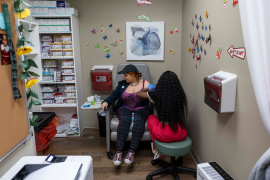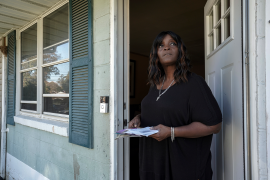Americans ages 50 to 70-those nearing the age of Medicare eligibility and those who recently enrolled in the program-place high value on Medicare, according to a study released today by The Commonwealth Fund. At the same time, many people in this age group are struggling to pay for prescription drugs, which Medicare doesn't cover. Medicare's benefit package was designed when the program was established in 1965 and hasn't changed significantly since then, despite the fact that drugs play an increasingly crucial role in modern medicine and in people's ability to live longer, healthier, and more productive lives.
Counting on Medicare: Perspectives and Concerns of Americans Ages 50 to 70 reveals that adults not yet eligible for Medicare are eager to join the program. Two-thirds of adults 50 or older but not yet eligible for Medicare say they would be interested in participating early, before age 65. And when respondents were asked who they would trust most to insure people their age, Medicare received the highest rating, outranking employer-sponsored coverage or direct purchase of insurance. The report also finds that Medicare beneficiaries ages 65 to 70 are more likely than adults ages 50 to 64 to be very confident in their ability to obtain quality medical care when needed and to be satisfied with the quality of that care. Sixty-eight percent of these recently eligible Medicare beneficiaries say it was "very important" for them to become covered by Medicare, and most rate their health insurance positively.

But the absence of comprehensive prescription drug coverage is a major concern among the 50 million people ages 50 to 70. Although eight of 10 adults in this age group have a health condition requiring regular use of prescription drugs, only half (54%) report having a drug benefit. Survey respondents, including those not yet eligible for Medicare who have inadequate or no employer-based coverage for prescription drugs, indicate that not having this crucial benefit creates barriers to care and imposes steep financial burdens on them and their families.
"Americans in this age group who are or will be covered by Medicare in the next 15 years generally trust in Medicare to provide excellent health care services," said Karen Davis, president of The Commonwealth Fund and a coauthor of the report. "But many of these people fear for their financial security if they have to set aside so much personal income to pay for drugs needed to maintain good health. In today's health care environment, the lack of a prescription drug benefit means that even those with health coverage are often underinsured."
Whether they are currently in Medicare or nearing eligibility, respondents lacking a drug benefit-even if they have other insurance-report high levels of out-of-pocket spending, difficulties affording doctors' recommendations for care, and struggles paying medical bills. One of 10 (9%) adults ages 50 to 64 and nearly one of six (16%) ages 65 to 70 report that they typically spend more than $100 per month out-of-pocket for prescription medications. Nearly one-fourth of Medicare beneficiaries without drug benefits spend at these levels each month. This amounts to an estimated 5 percent of income for one of five adults ages 65 to 70 and one of 10 adults ages 50 to 64.

Adults who lack prescription drug coverage also go without necessary care at alarmingly high rates. Otherwise-insured adults ages 50 to 70 who do not have a drug benefit are three times as likely as those with drug coverage to have let a prescription go unfilled because of the cost. Nearly one of six adults in each age group did not get a needed prescription medication, even though they had basic health insurance. Not surprisingly, men and women ages 50 to 70 endorse the idea of adding prescription drug coverage to the basic Medicare package: eight of 10 either strongly favor (62%) or somewhat favor (20%) such a proposal.
One explanation for the trust many people ages 50 to 64 place in Medicare may be the high uninsurance rates and instability of coverage among people in that age range combined with their increased risk for chronic, acute, or disabling health conditions. About 5.6 million of the 39 million men and women in this age group are uninsured, and those who lose their health coverage tend to go without needed medical care and remain uninsured for long stretches of time. One of five 50-to-64-year-olds reports a time without coverage since turning 50, including 15 percent who were uninsured during 1999. Among married adults ages 50 to 64, 21 percent say that they or their spouse, or both of them, were uninsured at one time during the year. The majority (53%) of adults 50 to 64 who were uninsured in the past year say they have been without health insurance for three years or more. Nearly seven of 10 who were uninsured for a time during 1999 have been without coverage for a year or more.
"Being uninsured at age 50 or 60 can quickly turn into a crisis for personal and family health," said Cathy Schoen, vice president of research and evaluation for The Commonwealth Fund and principal author of the report. "These men and women are telling us that at a time of life when they face increasing health concerns, having insurance they can depend on is critical. Medicare is a potential base on which to build."




